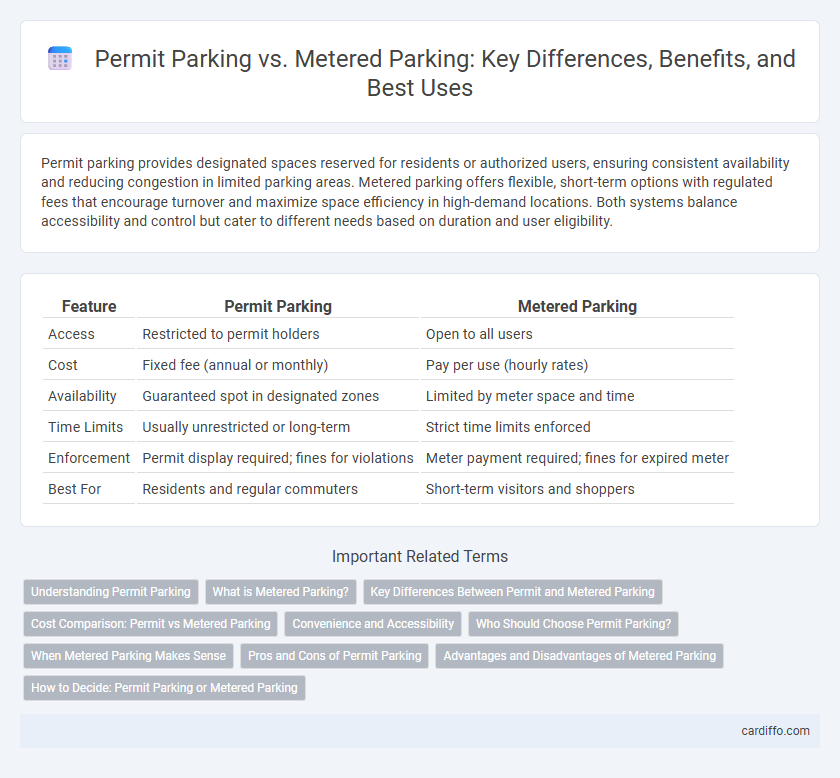Permit parking provides designated spaces reserved for residents or authorized users, ensuring consistent availability and reducing congestion in limited parking areas. Metered parking offers flexible, short-term options with regulated fees that encourage turnover and maximize space efficiency in high-demand locations. Both systems balance accessibility and control but cater to different needs based on duration and user eligibility.
Table of Comparison
| Feature | Permit Parking | Metered Parking |
|---|---|---|
| Access | Restricted to permit holders | Open to all users |
| Cost | Fixed fee (annual or monthly) | Pay per use (hourly rates) |
| Availability | Guaranteed spot in designated zones | Limited by meter space and time |
| Time Limits | Usually unrestricted or long-term | Strict time limits enforced |
| Enforcement | Permit display required; fines for violations | Meter payment required; fines for expired meter |
| Best For | Residents and regular commuters | Short-term visitors and shoppers |
Understanding Permit Parking
Permit parking offers designated spaces reserved for vehicles displaying valid permits, ensuring prioritized access in high-demand areas. This system typically benefits residents, employees, or specific user groups by reducing congestion and parking turnover. Regulations often govern permit issuance, duration, and enforcement to maintain order and accessibility.
What is Metered Parking?
Metered parking is a system where drivers pay a fee to park their vehicles in designated spaces for a limited time, typically through coin-operated or digital meters. This method regulates parking availability and turnover in high-demand areas by requiring users to purchase a ticket or use a mobile app to display valid payment. Unlike permit parking, metered parking is usually open to the general public and charges vary based on location, duration, and time of day.
Key Differences Between Permit and Metered Parking
Permit parking allocates designated spaces reserved for vehicles displaying valid permits, ensuring long-term parking for residents or employees. Metered parking operates on a pay-to-park basis with time limits enforced by parking meters, encouraging turnover and short-duration use. The primary differences lie in access control, duration flexibility, and payment structure, where permit parking offers extended, usually unlimited parking without hourly fees, unlike metered parking's strict time constraints and direct payment requirements.
Cost Comparison: Permit vs Metered Parking
Permit parking typically offers a fixed monthly or annual fee, providing cost savings for regular users compared to metered parking's variable hourly rates, which can accumulate quickly. Metered parking charges depend on the duration of stay, often making it more expensive for long-term parking but cost-effective for short visits. For frequent parkers, permits are economically advantageous, while meters suit occasional or brief parking needs.
Convenience and Accessibility
Permit parking offers long-term convenience for residents and frequent visitors by ensuring guaranteed parking spots, reducing the need to search for available meters. Metered parking provides flexible, short-term accessibility for casual users or shoppers, often located in high-traffic commercial areas with easy payment options via coins, cards, or apps. Both systems balance convenience and accessibility differently, with permit parking prioritizing exclusivity and metered parking promoting turnover and availability.
Who Should Choose Permit Parking?
Permit parking is ideal for residents, employees, or frequent visitors who require consistent and guaranteed parking access in high-demand areas. This option benefits those needing long-term parking solutions without hourly fees, ensuring convenience and compliance with local regulations. Businesses and institutions in densely populated neighborhoods often recommend permit parking to reduce congestion and streamline access control.
When Metered Parking Makes Sense
Metered parking makes sense in high-traffic commercial areas where turnover is essential to maximize space availability and support local businesses. It encourages short-term parking, facilitating frequent customer visits and reducing congestion caused by long-term vehicle occupancy. This system is effective in urban centers with limited street parking, promoting efficient use of curb space while generating revenue for municipal maintenance and infrastructure improvements.
Pros and Cons of Permit Parking
Permit parking offers long-term convenience for residents by securing parking spaces and reducing traffic congestion in designated areas. However, its limitations include restricted access for visitors, potential allocation inefficiencies, and the administrative burden of managing permits. Compared to metered parking, permit systems provide stability but may lack flexibility and immediate revenue generation.
Advantages and Disadvantages of Metered Parking
Metered parking offers advantages such as generating consistent revenue for municipalities and encouraging turnover, which increases space availability for short-term use. It also promotes fairness by charging users based on time, reducing the likelihood of long-term parking monopolizing prime spots. However, metered parking can be inconvenient due to limited payment options and fines for expired meters, potentially deterring visitors and creating enforcement challenges.
How to Decide: Permit Parking or Metered Parking
Choosing between permit parking and metered parking depends on the duration and frequency of use; permit parking suits long-term or daily parking needs, offering a fixed monthly or annual fee for designated spots. Metered parking is ideal for short-term or occasional visits, allowing flexible payment by the hour with variable rates based on location and time. Consider factors such as typical parking duration, cost-effectiveness, and proximity to destinations when deciding the most practical option.
Permit parking vs Metered parking Infographic

 cardiffo.com
cardiffo.com